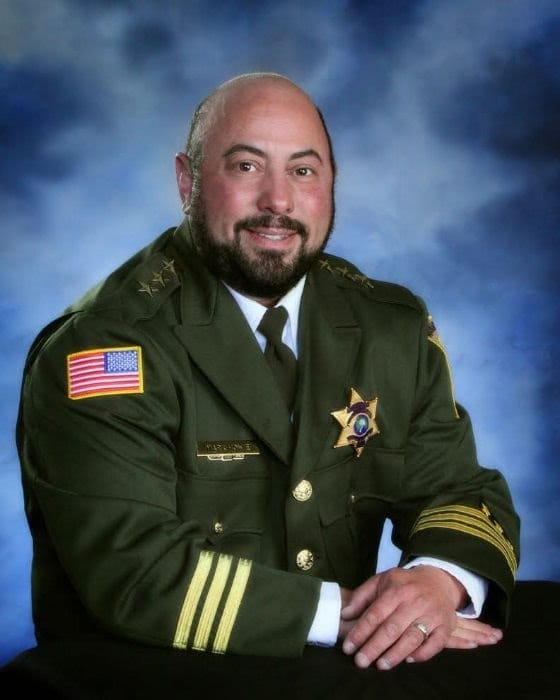These Washington educators have lost or surrendered their teaching license for alleged misconduct
A searchable teacher misconduct database compiled by InvestigateWest fills gaps in the state’s public-facing records
State Legislature failed to pass bill last session that would have disqualified him from running

In early January 2022, police officers in Sequim, a small northwest Washington town on the Olympic Peninsula, responded to a wrecked pickup truck partially submerged in water. A bystander reported the truck sped past a stop sign and collided with a tree in a nearby field, according to police reports.
At the scene were two intoxicated men in wet and muddy clothes, denying they’d been in the truck and refusing to give their names, records show. Though the driver gave in and was detained for driving under the influence, the passenger remained defiant.
“F— you,” he repeated again and again. Officers handcuffed the man, who threatened to sue, yelling that he’d been a cop for 20 years.
Finally, he gave up his name: Joshua Grasseth. Police booked him into jail for obstruction and unlawful possession of a dangerous weapon, since they found a switchblade knife in his pocket. He was found guilty for lying to police.
Nearly four hours away in a right-leaning rural county at the state’s southern border, Grasseth is now running for sheriff as a Republican in Wahkiakum County: population 4,400, the third smallest in the state. He’s spent the last two decades bouncing around small police agencies in Washington, but is no longer a working police officer. Two of those agencies would not share his personnel files, but InvestigateWest found that Grasseth has been convicted of at least two crimes while off duty and has a history of alleged domestic violence and dishonesty. The Wahkiakum County prosecutor says that, if elected, Grasseth’s troubled past would land him on the so-called Brady list — a list of officers flagged for credibility issues — that could undermine his credibility in court.
Grasseth’s opponent, current Sheriff John Mason, drew 85% of votes in August’s primary election. But police accountability advocates say Grasseth’s candidacy underscores a larger issue in Washington: Sheriff candidates are not backgrounded, and the state’s only requirement is that they complete basic law enforcement training within 12 months of taking office — a lax standard compared to what’s required to become a police chief or a lower-ranking officer or deputy. Had a bill increasing eligibility requirements passed the Washington State Legislature last session, his conviction for lying to police in 2022, a gross misdemeanor, would have disqualified him from running. Grasseth has no felonies on his record.

"Washington is exceptional relative to other states in having next to no eligibility requirements for sheriffs, even lacking the most common state requirements like a minimum age rule, or the requirement that the sheriff have a clean criminal record — or at least, no felony convictions — and undergo a criminal background check,” said Josh Parker, deputy director of policy at the Policing Project, an organization out of New York University’s School of Law that works to modernize law enforcement policies across the country. “Many states, including California, Georgia, Kansas and Oregon, also require sheriffs to be certified by a state licensing agency and stripped of that license if they engage in egregious misconduct."
Grasseth, 47, who has campaigned on being “accountable, transparent, and deeply engaged” with his community, did not respond to multiple requests for comment for this article. On his Facebook campaign page, he addressed his false statement charge by stating, “I chose not to provide information about an incident in which I was a passenger in a vehicle. I accepted full responsibility in court, where I was honest about my actions and intentions. I received no jail time as a result of my cooperation and accountability.”
But Grasseth’s opponents believe if he became sheriff, it would diminish public trust for the agency.
“We took many years to foster a level of trust and transparency and partnership with the people in the community, and it takes a long time to build that trust,” said Mark Howie who was the county’s sheriff from 2012 to 2024. “You’re jeopardizing that trust with people the second that person comes in with that type of stigma attached.”
Upon Howie’s retirement, he recommended John Mason’s appointment to county commissioners. They appointed Mason by a unanimous vote.
On Halloween night in 2009, Grasseth, then-working as a deputy for the Wahkiakum County Sheriff’s Office, called off work halfway through his shift, telling management he was sick and going home, but would remain on call.
Instead, Grasseth met his then-wife at the Monticello Hotel bar in Longview. The couple reportedly got into an argument that turned physical. Grasseth hit his wife three times, according to a witness in the police report. He was then kicked out of the bar and went back to the hotel room alone.
Hours later, Grasseth found his wife in the hotel parking lot in a vehicle with another man. He fought the man whom he had already suspected his ex-wife to be seeing, giving him a black eye and knocking out a tooth, court records show. She called the cops. Responding officers said Grasseth was “highly intoxicated” and arrested him for fourth-degree assault against his wife. The charge was reduced to disorderly conduct, a misdemeanor, and he was found guilty, according to court records.
The event was relayed to Grasseth’s boss, former Sheriff Dan Bardsley, who “strongly considered” terminating the deputy. Bardsley had already warned Grasseth to “avoid contact with” the man he fought, according to a disciplinary letter.
Later that month, Grasseth resigned. The next year, he ran for county sheriff, unsuccessfully.
He became an officer at the Lower Elwha Klallam Police Department near Port Angeles in the Olympic Peninsula in 2013. Then in 2018, he moved an hour and a half away to be a commander at the Port Gamble S’Klallam Police Department, north of Bainbridge Island. Neither department would share any information about Grasseth beyond confirming Grasseth worked there at one point.
In 2016, his ex-wife called the cops in nearby Clallam County, who arrested Grasseth for fourth-degree domestic violence, records show. That charge was dropped. His ex-wife declined to comment for this article.
On Grasseth’s campaign page, he addressed the domestic violence allegations raised by his ex-wife.
“These were only allegations, I have NO CONVICTIONS for such allegations because that is all that they were. I filed for divorce in 2016 and have had zero allegations or accusations since then.”
In the midst of the divorce and while working as an officer for the Lower Elwha Klallam Tribe, Grasseth allegedly got into a relationship with Savannah Roberts, 21 years old at the time. He was never charged with crimes involving Roberts. However, her sister, Samantha Hoines, said he abused her physically and emotionally and isolated her from her family for years.
Roberts, who once loved playing softball and being with her family and friends, had “become a shell of herself,” Hoines said. “He tore her down. It was so hard to hear my sister think that no one liked her and that she was scared to make friends.”
Roberts remained out of contact with her family for years, afraid to speak out on the abuse because Grasseth was a police officer and she feared retaliation or not being believed, Hoines said.
During their relationship, Roberts’ battle with alcoholism spiraled. After the two broke up a few years ago and the recent death of her grandmother, it intensified. Roberts died in April this year due to kidney and liver failure, Hoines said. She was 30.

Grasseth didn’t respond to multiple emails and phone calls from InvestigateWest. But a number that traced back to his wife, Amanda Grasseth, who is the Wahkiakum County election coordinator, texted an InvestigateWest reporter asking why the news organization was not looking for “anything positive about him.” She declined an interview request. Grasseth went to Facebook to announce a story was about to be published “including my past and false allegations,” characterizing the reporting as a “coordinated smear campaign” against him.
In Washington, sheriff candidacy requirements haven’t been updated since 1979 and only require a training certification post-election. Meanwhile, a 2021 law strengthened the backgrounding of peace officers to include a check into whether they are on any Brady lists maintained by county prosecutors.
“An 18-year-old without any law enforcement experience can run for sheriff, and I think that would surprise some people,” said Leslie Cushman, advisory committee member for the Washington Coalition for Police Accountability, an advocacy group made up of families impacted by police violence, experts and other policy-focused organizations.
Grasseth hasn’t worked in law enforcement since 2021, and his training certificates have expired, according to Washington’s Criminal Justice Training Commission. If Grasseth assumed office, he would have up to a year to complete required training.
House Bill 1399, the bill that failed to pass the Legislature last year, would have changed eligibility requirements for sheriff candidates to include having: a high school diploma, no felony or gross misdemeanor convictions, no revocation of law enforcement certification, two years of law enforcement experience, to be at least 25 years old, and for those once in the military to have received at least a general discharge under honorable conditions. Additionally, it would have required sheriff candidates to complete a background check, which is already required of police chiefs and town marshals, the two other highest-ranking local law enforcement officials in a given jurisdiction.
“It actually is just a bread and butter good governance bill,” Cushman said. “It really is about having strong leadership in place that is subject to the same requirements as the rank and file.”
Aside from stricter requirements, the bill would have limited the authority of sheriff volunteers, who can assist law enforcement agencies with security at community events, traffic control, and search and rescue operations. The bill also called for sheriff candidates to complete an extensive background check — the same one mandated for peace officers — which would then be verified by the Criminal Justice Training Commission. Both provisions drew pushback from the Washington Association of Sheriffs and Police Chiefs and rural constituents.

Howie, the former Wahkiakum County sheriff, opposed the bill. He said he supports more qualifications for sheriff candidates that could lead to disqualifying someone for integrity issues, but he “would not support any state-appointed political body” to conduct background checks on candidates.
“You could have somebody from the far right or the far left that is gunning for a particular candidate because they have different views,” he said. “I just wouldn’t trust that kind of system.”
Dan Bigelow, the Wahkiakum County prosecutor, agreed with Howie’s concern that the background check could be used for political purposes.
“The idea was for counties to be able to elect their own people for better or for worse,” he said. “That was how the state started out, and this seemed to be a retreat from that. Although, I gotta say, there’s some folks who I wouldn’t mind seeing knocked off.”
For police accountability advocates, the prospect of an elected sheriff with a dicey past is even more troublesome as more rural sheriffs, like those in Klickitat and Adams counties, align with the constitutional sheriffs movement — the idea that sheriffs, believed to have supreme authority in their jurisdiction, chose to enforce their own rules instead of federal or state laws. Some Washington sheriffs are flouting the state’s “sanctuary” law by helping enforce federal immigration orders.
“Constitutional sheriffs are something that we’re worried about,” said Cushman, who testified in support of House Bill 1399 earlier this year. “[They] think they are the highest law in the land and that they interpret the law and that they are allowed to keep everybody else out of their jurisdiction, including the federal government.”
She and others advocating for stronger police accountability laws are drafting a similar bill for next session. In this new version, the bill requires sheriffs to “uphold and enforce” state law.
“There’s a lot to be said for the people, the residents of the state of Washington, to have confidence that wherever they are, their law-enforcement leader is subject to the highest standard,” Cushman said.
Cushman and her organization started drafting legislation for stricter sheriff requirements after former Pierce County Sheriff Ed Troyer was accused of falsely reporting that a newspaper carrier threatened to kill him — conduct that led the state’s attorney general to prosecute him.
Troyer was ultimately acquitted of the false reporting charge, but records show his name was added to Pierce County’s Brady list in November 2021, roughly a year after he became sheriff. Pierce County Prosecutor Mary Robnett says his entry on the Brady list didn’t have “a huge effect” on the court.
A Brady list is a record kept by prosecutors of law enforcement officers with credibility issues such as dishonesty or misconduct that must be disclosed to defense attorneys in criminal cases. If a county sheriff was on the Brady list and testified in court, the defense could call out their misconduct in front of a jury, undermining their credibility as a witness.
“We’re a big county, almost a million people, and he has hundreds of deputies and detectives and corrections officers work for him,” Robnett said. “He was never a witness in court.”
Bigelow, prosecuting attorney for Wahkiakum County, said if Grasseth were elected, he would go on the Brady list both due to his dishonesty as a deputy in 2009 and because of his more recent false statement to a law enforcement officer charge in 2022. Bigelow said he’s not already on the list because he’s not currently a law enforcement officer.
“He called out sick when he wasn’t sick,” said Bigelow, Wahkiakum County prosecutor. “That’s an act of dishonesty but not a crime. An act of dishonesty in his official capacity would go on the [Brady] list anyhow. What really locked it in was the conviction for a false statement to a public servant. … Those would all go on the list.”
In 2022, the Washington Association of Prosecuting Attorneys adopted a model policy advising county prosecutors to “err on the side of disclosure” when deciding whether to place someone on the Brady list. The Wahkiakum County Prosecuting Attorney's Office said it follows this policy.
As part of an ongoing series examining officers with credibility issues in Washington, InvestigateWest reviewed hundreds of Brady list records and found a wide variety of reasons why officers in Washington were placed on the Brady list, including having a DUI, unsatisfactory work performance, being inappropriate to co-workers, time theft, sexual assault and domestic violence, to name a few.
“If you have an officer with, for example, a history of lying, then that should be relevant in virtually every case that officer is involved with,” said Rachel Moran, a former public defender turned professor researching access to officer misconduct information at the University of St. Thomas School of Law. “But if you have an officer who has, let's say, a conviction for a DUI, there might be very limited situations in which there's any reason to disclose that in a particular case.
“Instances of dishonesty, false testimony, falsifying a police report, that kind of thing, are the most significant information in terms of impeaching the credibility of the officer.”
In a small county like Wahkiakum, sheriffs play a larger role due to the small size of their agency. The county only has seven deputies, including the sheriff and undersheriff.
“It wouldn’t bode well for any sheriff’s office in our state, or anywhere, to have an elected official, the leader of that office, on the Brady list,” Howie said. “That would be very damaging.”
Based on the results of the primary election in August, Bigelow doesn’t think that will happen.
“I think that the county spoke pretty loudly in the primary about not wanting a convicted criminal to be their sheriff,” Bigelow said.
This project was completed with the support of a grant from Columbia University's Ira A. Lipman Center for Journalism and Civil and Human Rights in conjunction with Arnold Ventures, which has funded MuckRock to support this reporting.
The story you just read is only possible because readers like you support our mission to uncover truths that matter. If you value this reporting, help us continue producing high-impact investigations that drive real-world change. Your donation today ensures we can keep asking tough questions and bringing critical issues to light. Join us — because fearless, independent journalism depends on you!
— Jacob H. Fries, executive director
DonateCancel anytime.
Subscribe to our weekly newsletters and never miss an investigation.